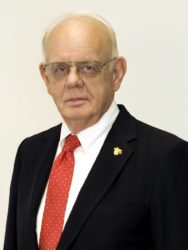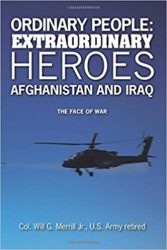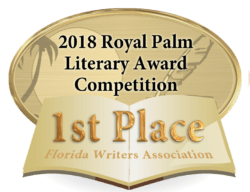
Writing military history is an important task requiring accuracy and attention to detail while still having lean prose. Extensive experience in creating reports and briefings while serving thirty-one years in the armed forces gave Will G. Merrill, Jr. these skills. He used them to write his second book, Ordinary People: Extraordinary Heroes—Afghanistan and Iraq, which tells the true stories of real-life heroes. His book won First Place for Published History in the 2018 Royal Palm Literary Awards. Will talks about the interplay of his military experience and his writing skills during this week’s RPLA showcase.
Will’s Writing Journey
I learned to write by reading. I was a vociferous reader starting when I first learned to read. I found English grammar boring but learned it by reading books that I enjoyed. (I was once caught reading a classic during an eighth-grade history class. The teacher was almost complimentary when he found out what I was reading. He said, “At least it wasn’t a comic book.”) I took a freshman English class at a small college in northern Wisconsin. When I hurried through a writing assignment, my professor, without naming me, used it as an example of how not to write. I was embarrassed. The same teacher used my next effort as an example of HOW to write. The following year, I was appointed to attend West Point where I did quite well in my writing. I submitted two major assignments in my Junior year and received maximum scores on both.
Later, in many military jobs over thirty-one years, I became noted for my writing ability. In one case, one of my bosses said, “If you need something written, give it to Will Merrill. He can justify anything!” Over the years, I received many important jobs requiring detailed, accurate, concise reports. I was also often asked to prepare briefings for senior officers. In one example, during the civil disturbances of the 1960s, I often prepared and gave briefings about the military’s involvement in these events. Later, as the Operations Officer of the 2nd Infantry Division on the DMZ in Korea, I prepared daily briefings for the Commanding General and his staff. These briefings had to be complete, accurate and concise. For significant events, such as hostile contact with North Korean forces, my reports went through channels to senior officers in the Pentagon and State Department.
I spent the last six years of my military career as the senior Liaison Officer in Greece representing NATO Headquarters in that country. This position also required accurate, concise reports, often classified, to the NATO headquarters I was representing. My military and civilian schooling also required a considerable amount of writing on various subjects. My education included attendance at the Army Officers Basic and Advanced Courses and the Armed Forces Staff College. I also achieved a master’s degree in business at Webster College. I did well in all of the writing requirements for these schools.
The Winning Entry, Ordinary People: Extraordinary Heroes—Afghanistan and Iraq 
Logline: True stories of the bravery and sacrifice of our military after 9/11 inspire all Americans and remind us of the cost of war to the Extraordinary Heroes who protect our nation.
I wanted the American public to understand the bravery and dedication of our military after the attack on our country on 9/11. I also wanted to recognize the contributions of our military, both individuals and organizations. To do this I included active duty military, National Guard and Reserves, Army, Air Force and Navy, former military and people who had never served in the military who volunteered to go into combat. (In one instance, a noted physician who volunteered to go to war and served both in Iraq and Afghanistan.) I included soldiers who were badly wounded and parents of soldiers killed in battle. Stories are told of women who served admirably, a foreign soldier who was badly wounded, losing both his legs when he stepped on a mine, and an immigrant from Egypt who wanted to serve his new adopted country.
Two Truths and a Lie, Writer’s Edition
An author should not be his/her own editor.
It is important to gain the reader’s attention in the first few pages.
A well-written book will market itself.
The lie? A well-written book will market itself!
Other Works by Will
This was a follow-on book to my first book, 9/11-Ordinary People: Extraordinary Heroes—NYC, The First Battle in the War Against Terror! (This book was RPLA Book of the Year in 2012. It was also military_writers.com Book of the Year and is now on sale at the 9/11 Museum in NYC). Experts say that most self-published books rarely sell more than seven hundred copies. This book has sold more than 13,000 copies and, with sixty-four reviews, has an average of 4.5 of 5 stars on Amazon.com.
Coming Next from this Author
I am working on a book about a former US Army Ranger who became a CIA agent in the War Against Terror. You can also purchase a copy of Ordinary People: Extraordinary Heroes—Afghanistan and Iraq here on Amazon.
More about RPLA
The Royal Palm Literary Awards competition is a service of the Florida Writers Association established to recognize excellence in members’ published and unpublished works while providing objective and constructive written assessments for all entrants. Judges include literary agents, publishers, film producers, current or retired professors, teachers, librarians, editors, bestselling and award-winning authors, and journalists from across the nation. Entries are scored against the criteria set by RPLA using rubrics tailored to each genre. Winners are announced at the annual FWA conference during the RPLA awards banquet. To learn more about RPLA, click here for the guidelines.

